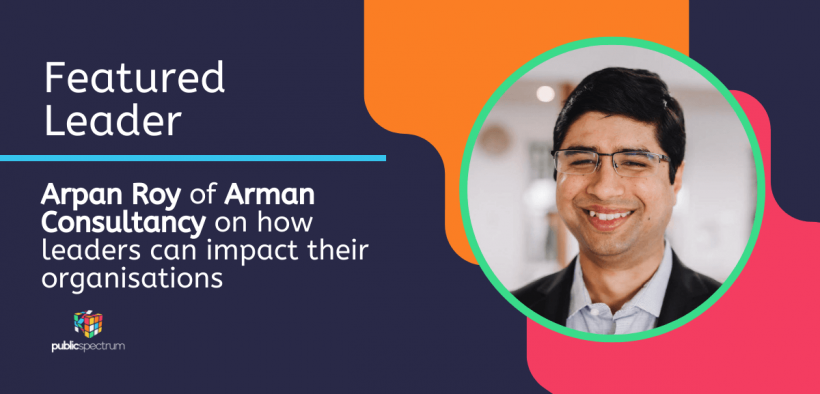An organisation can only achieve its greatest when the person at the helm is at their best, so how can leaders guide their people in the best and most effective way possible?
Public Spectrum has caught up with Arpan Roy, Director and Co-Founder of Arman Consultancy, for his insights on the ways leaders can impact their organisations.
Arpan leads a business that’s focused on Leadership Coaching and Training, collaborating with leaders in corporate organisations and businesses to improve engagement and productivity to enable them to create and add value for stakeholders and customers. He has had extensive experience in developing leadership capabilities, boosting team engagement, analysing and solving problems, and mentoring individuals to lead with greater confidence and impact.
Arpan has helped leaders in strengthening their mindset for change and growth, lack of team engagement, low productivity, challenges around sales, the culture of reactive thinking within the team, and inspiring their team to realise their potential and seek growth.
Arpan is also the author of an Amazon best-selling book ‘A Servant’s Heart- Leadership That Inspires’ as well as the recipient of ‘100 Top Training and Development Minds- Global’ at the World HRD Congress 2018.
In this interview, Arpan explains what leaders can do to ensure that their actions benefit the workplace.
How has leadership in an organisation changed in the last few years?
I feel something that’s changed over recent years is how leaders have started to look out for their people. Leadership has always been about people. However, for a variety of reasons, many leaders have developed a tendency to overlook their people and prioritise profitability, client acquisition, customer satisfaction etc.
Now there’s nothing wrong with focusing on those aspects. The issue is when leaders do so without taking their people along. Most leadership challenges stem from the fact that at some level, leaders haven’t supported or cared for their people well enough. Movements such as The Great Resignation and Quiet Quitting are great reminders for leaders to consistently serve, support and nurture their people.
I believe organisations and leaders are now being more mindful of how they can support their people, and recognise that people are an integral part of their success. Renowned leaders such as Indra Nooyi and Jeff Bezos have been vocal about organisations needing to care more for their people.
As more organisations are moving to agile ways of working, practices such as servant leadership are being followed increasingly. There’s also an emergence of roles such as People Leaders and People and Culture managers, who are focused on creating people-centric cultures.
This is an important change, and it must be adopted widely. Because as much as the future of work involves discussions around robotics, machine learning, AI etc, leaders must remember to include their people in those discussions.
What common mistakes do you find that leaders often make and how does it affect the workplace?
One mistake that leaders commonly make is having a lack of awareness. This can play out in 3 areas- their environment, their work, and their people. When leaders lack awareness of their environment, they may not know of potential problem areas that could affect their team.
When leaders lack awareness of their work, they may not be completely across the deliverables of their team, what processes they follow, how their team is progressing, and what roadblocks they are up against. When leaders lack awareness of their people, they may not be across what their needs and challenges are, and hence, they may not be able to support them in the best way possible.
Leadership works best when leaders understand their environment, processes and people. However, lack of awareness can limit leaders’ ability to show empathy and emotional intelligence, and severely affect the impact they have on their team and environment. In fact, they often find themselves playing catchup and fighting fires rather than being proactive and being on top of things.
As the Co-Founder and Director of Arman Consultancy, what are the ways that you have helped leaders improve in a way that has benefitted their workplace?
That’s a great question! A huge focus of my work is to enable leaders to lead with greater impact and confidence. I believe leaders have most impact when they engage, inspire and empower others. When leaders get this balance right, they are able to connect with people, build relationships, make people believe what’s possible, and importantly, make them believe in themselves and enable them for achieving great results.
So I work with them to develop a growth mindset and strategies that help them be more effective in their role. This can be done through coaching sessions (for individuals) and training sessions (for teams).
Through this, the outcomes that leaders have usually experienced are at 2 levels:
Team/organisational level: They have been able to create a culture where people thrive and they take more ownership. The overall trust within the team has gone up, and the team as a whole has been more resilient and responsive to any challenge. People have enjoyed their work, due to which their performance has improved, and so has their customer/stakeholder engagement.
Individual level: By extending their impact, leaders have been seen as a key person of influence within the organisation, and they have positioned themselves for additional leadership opportunities. This is especially relevant for people who’ve just started off in leadership roles, or for people in middle management roles.
Aside from your newsletter “High Impact Leadership” on Linkedin, what are your other plans for helping people build their leadership skills?
My vision is to enable 25,000 or more leaders by the year 2025. As part of fulfilling this vision, I plan to launch a series of short courses that target a multitude of leadership competencies such as stakeholder engagement, communication, problem-solving, decision making and others.
I am also in discussions with organisations as well as corporate event companies regarding opportunities to facilitate training sessions, that would help people enhance their leadership capabilities, and provide a highly valuable experience for them.
I also love creating content that adds value to others. As a part of this, I regularly share posts on LinkedIn that aim to deliver practical insights to people in my network. I also have a YouTube Channel titled ‘Leadership Insights with Arpan Roy’ that talks about key leadership challenges and shares insights and strategies that help people overcome them.
Eliza is a content producer and editor at Public Spectrum. She is an experienced writer on topics related to the government and to the public, as well as stories that uplift and improve the community.






























































